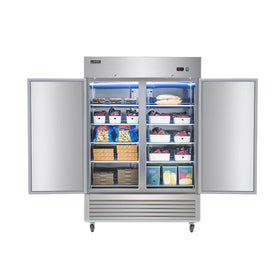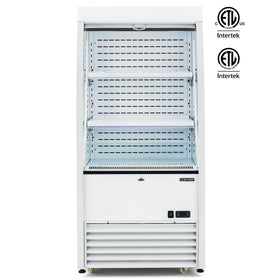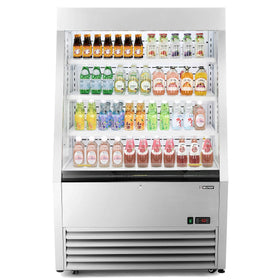Salmon is a popular and delicious fish, but like all seafood, it’s important to know how to store it properly such that it maintains its freshness and remains safe to eat.
How long salmon can last in the fridge can vary depending on its form and how it is stored: raw salmon can last between 2-5 days in the fridge, while cooked salmon and vacuum-sealed salmon can last for longer, especially if they are properly stored in an airtight container or tightly wrapped in plastic wrap or foil.
In this guide, we will discuss, in detail, the questions you might have about storing your salmon in the fridge. Here are some common questions we will cover:
- How long does fresh salmon last in the fridge?
- How long does cooked salmon last?
- How long does raw salmon last?
- How long does thawed salmon last?
- How long does defrosted salmon last?
- How long does smoked salmon last?
- How long does vacuum-sealed salmon last?
-
How to know if salmon is bad?
For reference, here is a brief summary of how long you can expect different forms of salmon to last in the fridge if you store them properly
|
Type of Salmon |
Fridge Shelf Life |
|
Raw salmon |
1–2 days |
|
Cooked salmon |
3–4 days |
|
Thawed salmon |
1–2 days after thawing |
|
Smoked salmon |
1–2 weeks (unopened) |
|
Defrosted salmon |
cook immediately |
|
Vacuum-sealed salmon |
1–2 weeks (unopened) |
How Long Does Fresh Salmon Last in the Fridge?
Fresh or raw salmon has a particularly short shelf life and can only last 1-2 days in the fridge before it goes bad. It is advisable to cook up fresh salmon as quickly as possible or store it in a freezer where it can last for weeks.
How Long Does Cooked Salmon Last in the Fridge?
Cooked salmon can last for 3–4 days in the fridge if you store it properly. To ensure that your salmon stays fresh and healthy for up to 4 days, take the following steps:
- Refrigerate it within 2 hours after cooking to prevent bacterial growth.
- Store it in an airtight container or wrap it tightly in plastic wrap or foil.
Cooked Salmon Lasts Longer in the Freezer
If you don't plan to eat the cooked salmon within the recommended timeframe, consider freezing it for longer storage. In the freezer, cooked salmon can last for up to 2–3 months.
When you take it out of the fridge, make sure you reheat the cooked salmon to 165°F (74°C) before consuming. This is a crucial step for food safety.
How Long Does Raw Salmon Last in the Fridge?
Raw salmon typically lasts only 1–2 days in the fridge, even if you store it at or below 40°F (4°C). Because it is highly perishable, it is always advised to cook your raw salmon as quickly as possible and not leave it in the fridge for too long.
How to Store Raw Salmon in the Fridge
If not properly stored in the fridge, raw salmon can go bad even within a day. To ensure your raw salmon is properly stored in the fridge:
- Keep it in its original packaging or vacuum-sealed so it retains its freshness.
- If not in its original packaging, store it in a plastic bag or an airtight container.
- Place it on the bottom shelf of the fridge to avoid contaminating other foods with raw juices.
If you don’t plan to eat it within 1–2 days, freeze your raw salmon so it can last even longer.
How Long Does Thawed Salmon Last in the Fridge?
The best method for thawing fish is in the fridge, where the temperature is stable and safe. However, thawing salmon in the fridge does not significantly increase its lifespan.
Thawed salmon typically lasts about 1–2 days before cooking. To ensure your thawed salmon is safe for consumption, pay attention to the following tips:
- Don't refreeze thawed salmon unless it has been thawed in the fridge.
- If you thawed salmon using a cold water or microwave method, you must cook it immediately. Cooked salmon can then be stored for an additional 3–4 days.
How Long Does Defrosted Salmon Last in the Fridge?
If your salmon was defrosted in the fridge, it will be good for 1–2 days. However, if it was defrosted using quicker methods like cold water or microwave, you should cook it right away.
- Always defrost in the fridge for best results.
- Once defrosted, cook salmon within 1–2 days.
- Do not refreeze defrosted salmon unless it has been thawed in the fridge.
Smoked Salmon: How Long Does it Last in the Fridge?
Smoked salmon significantly differs from fresh salmon and can last 1–2 weeks in the fridge as long as it is unopened. Once opened, it might begin to lose its flavor within 5–7 days. For the best flavor and also for your food safety, it is advisable to consume smoked salmon within 5-7 days.
Tips for Storing Smoked Salmon in the Fridge
- Keep it sealed in its original packaging or in an airtight container.
- Refrigerate immediately and keep it below 40°F (4°C) to preserve its quality.
- Smoked salmon can also be frozen if you want to extend its shelf life for up to 2–3 months.
How Long Does Vacuum-Sealed Salmon Last in the Fridge?
As long as it remains unopened,vacuum-sealed salmon can last 1–2 weeks in the fridge. However, once you’ve opened the packaging, treat it like fresh salmon and eat it within 1–2 days.
Tips for Storing Vacuum-Sealed Salmon in the Fridge
- Keep it in its original vacuum-sealed packaging until ready to use.
- After opening, transfer to an airtight container or plastic wrap and refrigerate promptly.
- If you won’t use it within the given timeframe, freeze it for up to 6 months.
How to Tell If Salmon Is Bad
You can tell if salmon has gone bad and is no longer safe to eat if it begins to exhibit some signs normally associated with many other types of bad fish. Here’s what to look for:
- An off or sour smell: if it smells sour, rancid, or ammonia-like, it’s spoiled.
- Discoloration: if it becomes grayish, brown, or dull, it’s a sign that it’s no longer good.
- Slimy or sticky texture: the surface becomes slimy or overly sticky to the touch.
- Mold or discoloration on the skin: if you see any discoloration or mold, discard the salmon immediately.
- Expiration Dates and Storage Time: always check the sell-by or use-by date on packaged salmon. If it’s past that date or has been in the fridge too long, it’s better to be safe than sorry.
Points to Remember When Storing Salmon in the Fridge
To ensure your salmon stays fresh and safe to eat, remember the following:
- Raw salmon lasts 1–2 days in the fridge.
- Cooked salmon stays fresh for 3–4 days.
- Thawed and defrosted salmon should be cooked within 1–2 days.
- Smoked and vacuum-sealed salmon lasts longer—1–2 weeks unopened.
- Always refrigerate salmon promptly and store it in an airtight container.
- When in doubt, use your senses—smell, texture, and color will tell you if it’s still good. And if your salmon has passed its prime, don’t risk it.
Best Recommended Refrigerators for Storing Your Steak
The quality of your refrigerator plays a huge role when it comes to storing delicate items like salmon.
Wilprep’s Kitchen has a variety of reach-in refrigerators, perfect for your home or commercial kitchen, and with advanced features that make storing perishable items (like salmon) not only safe, but also easy and convenient.
These reach-in refrigerators will become the backbone of your kitchen: providing steady and reliable refrigeration and maximizing energy efficiency.
Whether you have a commercial kitchen, a really big private kitchen, or a small home kitchen, you are guaranteed to find a perfect match.
Here are some samples from Wilprep’s collection:
Commercial Solid Door Reach-In Freezer 18.7 cu. ft. Capacity
Designed for smaller kitchens, this solid reach-in refrigerator has a total capacity of 18.7 cu.ft. Here are some key features:
- Adjustable temperature range of -11 to 14°F
- An auto defrost design to prevent frost or ice buildup.
- 5 adjustable shelves, with each capable of holding up to 88 lb.
- A smart door that automatically closes when opened to 90°
- A Cubigel compressor and copper evaporator for fast and even cooling
- Certified for safety and quality by ETL, ETL Sanitation, and DOE
81'' Commercial Solid Door Reach-In Refrigerator 61 cu. ft. Capacity
This solid-door commercial reach-in refrigerator is perfect for businesses that have perishable items like eggs, milk, vegetables, and more fresh produce.
- A total volume of 61 cu. ft., and a temperature range of 32-50°F
- A stronger Cubigel compressor and copper evaporator
- An auto-defrost design that prevents frost or ice buildup.
- 15 adjustable shelves, with each capable of holding up to 88 lb.
- LED lights light up, allowing you to empty or stock up your refrigerator with ease.
- Certified for safety and quality by ETL, ETL Sanitation, and DOE
More from Wilprep
These are just a few of the commercial display refrigerators in Wilprep’s collection. If you are still undecided about which model best suits your business needs, you can refer to Wilprep’s official website for more options.
Wilprep’s collection of commercial refrigerators contains a variety of models, including display refrigerators and open-air models to suit the needs of diverse businesses.
In addition to top-quality refrigerators, Wilprep offers other kinds of kitchen equipment to take your business to the next level.
Check out Wilprep’s commercial convection ovens, commercial gas ranges, and even soup kettles.










